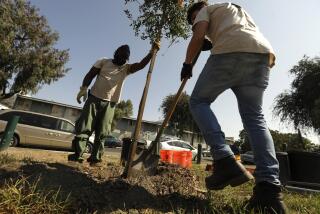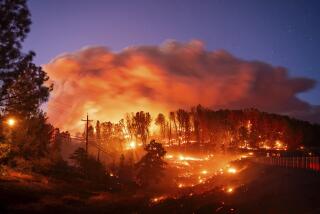CONSUMERS : A Brush With Responsibility
Southern California’s fire season began early this year--it was declared Monday by state fire and forestry officials. That means it’s time to ensure that hazardous brush, trees and other vegetation on your property have been cut back as legally required.
From Ventura County to San Diego County, owners of hundreds of thousands of mountain and hillside homes have received notices from city and county fire departments to clear brush. Others will be getting notices through June 2.
Don’t ignore the notices, fire department officials advise, because the home you save with proper clearance work may be your own.
If you can’t do the work yourself, hire a reputable contractor. Most give free estimates. Their fees depend on the lot size and the difficulty of removing the brush. Steep hillside lots cost more.
The costs may range from $50 to several thousand dollars, said Don Sitts, a Los Angeles City Fire Department inspector who works with the brush clearance unit.
Inspections Started
Many fire departments started house-to-house inspections this week; weed abatement programs and inspections continue in rugged hillside areas, whether the property has a structure on it or is vacant.
“We’ve had the same problem for the last few years, very little moisture this spring,” said Los Angeles County Fire Capt. Gary Oversby. “So the grass is curing quicker and dead grass will not green up, so it has to be cleared. But, it’s a Catch-22 situation. If we get rain, there’ll be more grass to dry out. If we don’t, then the trees dry out and that increases the dead fuel.”
If you’re concerned about which vegetations pose dangers, most fire departments or the California Department of Forestry can provide brochures describing safe plants and bushes and those that are hazardous. Among the most dangerous are those with high oil content, such as chamise or greasewood, and California buckwheat.
State fire regulations require clearance of flammable vegetation for at least 30 feet from any structure in a hazardous area. Cut back natural vegetation to 18 inches in height for another 70 feet. Remove tree limbs within 10 feet of a chimney opening and ensure that the opening is covered with a half-inch wire mesh spark arrester.
Stricter Rules
For properties in more remote canyon areas, fire officials also can insist that owners cut back grass to 200 feet.
Some cities and counties have even more stringent rules. Los Angeles, for instance, requires that grass and weeds be cut to 3 inches in height and tree branches be trimmed from ground level to a height of 5 feet in dangerous fire areas.
In 1981, the city Fire Department instituted a brush task force of 55 specially trained firefighters who inspect properties citywide, about 110,000 parcels each year in the Mountain Fire District and the buffer zone near it.
If task force teams inspect your neighborhood and you haven’t cleared properly, they will issue a noncompliance notice and give you a deadline to complete work. They also post a bright orange copy of the notice on your property.
Well-Maintained Plants OK
But before you rush to cut down your bougainvillea, be advised that “these requirements do not normally apply to a live, well-maintained and irrigated domestic landscape from which all dead materials are removed,” fire officials noted.
The Los Angeles County Fire Department has a similar basic brush clearance program; its inspections are handled by the 128 county engine companies and in the 47 cities that the county contracts with for fire protection. Its weed abatement crews also do brush clearing and prescribed vegetation burns in selected areas.
If you haven’t cleared the property when it’s inspected, you will get a notice to do so. If you continue to ignore the notice, the county can issue you a citation. That’s when it starts to cost money. Fines can go from $50 for a first citation to $500 for the fourth; further citations are misdemeanors, costing $500 each. You also can end up fighting with the district attorney in court.
“We’re getting more teeth in the laws,” Oversby of the county said. “So it costs them a little bit more than time now.”
May End Up in Court
The Orange County Fire Department, which last year issued 506 citations to homeowners for ignoring notices, also may drag you into court if you fail to comply with brush clearance rules, as will San Diego County.
“We give them three shots to comply, then we take them to court,” said Kevin Turner, the Orange County department’s wild land specialist and fire defense planner. “They get a fine and are put on probation for the next year.”
In most instances, if you fail to comply with the rules in a timely manner--each jurisdiction has different deadlines--you will end up spending much more money than if you had done what you were supposed to do. There are appeals--to fire board commissioners or county supervisors--but they’re time-consuming, and if you lose, you must pay the clearance bills and fees anyway.
If you wait until local agencies send in crews to clear your property, you may end up paying an administrative service charge, besides contractor fees. The extra charges vary widely, depending on where you live.
Sampling of Fees
The administrative fee, beside contractor charges, for the Los Angeles City Fire Department is $250; the Orange County Fire Department charges $233; Ventura County, $221; Los Angeles County, $70; San Diego County does not charge the added fee.
In some counties and municipalities, you can pay the fees and charges separately, but in most cases, they get tacked on as a special assessment to your next year’s property taxes. If they’re unpaid, they become a property lien, a potential block on your later ability to later sell your holdings.
If property is in escrow, sellers must clear the brush and assume the expense, Los Angeles city fire officials said.
Fire departments decline to endorse private brush clearing contractors. But the Los Angeles City Fire Department, for example, provides a list of 32 contractors operating citywide “as a convenience for property owners.”
Poison Oak a Special Case
If you have a lot of poison oak on your property, you must find a contractor who specializes in removing it, Los Angeles City firefighter Vince Marzo said. “Only certain contractors will handle that,” he explained, noting that you can get a list of contractors at the local fire station or check in the telephone directory under lot cleaners, landscapers or gardeners.
“I don’t go out of my way to take poison oak jobs,” said Courtney Kite of Kite Weed Control, a Pasadena brush clearance contractor for 17 years who does work for homeowners as well as contracting jobs for the city.
Homeowners seeking reputable contractors should ask for references. They also should ensure the contractor is experienced in the work and knows the local fire regulations.
“Most people look for the (good) price,” Kite said, “but quality work should have a little more consideration. Some contractors are so inexperienced they’ll clear weeds to the bare ground and that’s not good, because then you can have a soil erosion problem.”
Kite also noted that homeowners may wish to check whether a contractor carries liability insurance and workers’ compensation for employees because the work can be dangerous.
New Notice System
In Ventura County, where the Fire Department requires clearance 100 feet from a structure, Battalion Chief Dick Perry said his agency is experimenting with a new system of sending out notices.
They will go in three mailings to different areas; Simi Valley, Moorpark and Thousand Oaks residents, for example, got the first notices on April 10 and have until Tuesday to comply.
Perry explained that firefighters don’t necessarily enjoy the chore of enforcing brush clearing rules, any more than property owners like complying with the rules.
“We’re wearing a hat we usually don’t wear,” he said. “It’s one of the few things we do of an enforcement nature and it upsets some people. We probably have as aggressive a program as they have anywhere in the state. But it’s for the protection of the people.”
More to Read
Sign up for Essential California
The most important California stories and recommendations in your inbox every morning.
You may occasionally receive promotional content from the Los Angeles Times.










